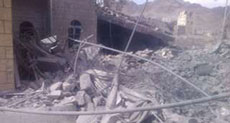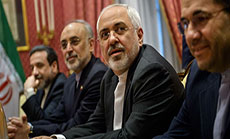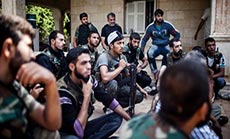The Women of Karbala: Political Lessons of Revealing Truth


Nour Rida
The epic of Karbala, or call it the school of Karbala, has held within its folds lessons on the role of women, most importantly the political role, in this event as well as in general life.
A flashback on Karbala: it is the 61 AH- 680AD battle in which Imam Hussein (grandson of the Prophet Mohammed) was martyred along with seventy-two of his supporters and family, while his household of women and children were taken captive.
The young Islamic Republic had been divided on the question of leadership during the Ummayad caliphate. While Imam Hussein defended the lineage of the Prophet Mohammed, Yazid, the son of the ruling Caliph Muawiya, at the time wished to usurp leadership, and was in fact a corrupt leader who broke all the rules of Islam and ethics.
When studying the epic of Karbala, we should not be oblivious to its full dimensions. One should be aware of the fact that during this everlasting event, some decent and magnanimous women also made their sacrifices and applied the lessons of Islam.
If we take a glance at the role of women in history, we see that women no doubt have and should always have a role in life, both indirect and direct.
Women are the schools that raise generations of women and men, who in their turn make history. That is if we speak of the indirect role of women.
But more important is that women enjoy their own direct role in history, it is the role Islam stresses evidently as demonstrated in the holy Quran, which reflects the highest status for women when it comes to Islamic history. The women of Islam are social and professional as well as chaste and honorable.
Adopting the same Islamic methodology that focuses on the direct role of women, we go back to the battle of Karbala.
Imam Husain's family accompanied him to Karbala. In such a great event of early Islam, like many others, both men and women need to play their roles. If Imam Hussein was the Master of the Martyrs of Karbala, Sayyida (Lady) Zeinab, his sister, also was the Master of the Messengers of Karbala.
If Imam Hussein and his companions struggled against the corrupt regime of Yazid with their swords and arrows, Sayyida Zeinab and the women fulfilled their struggle with their tongues and words.
If Imam Hussein and his companions revived Islam with their blood, Sayyida Zeinab and the women carried the message and revived God's religion with their speeches.
If Imam Hussein and his companions taught the lessons to their children and nurtured them on resisting tyranny, Sayyida Zeinab and the women pursued teaching them and taking care of them after they were orphaned.
In fact, without the women accompanying Imam Hussein and his companions, no one would have narrated the true picture of Karbala, and no one would have played the role of propagating the truth, defending the grandson of the Prophet, and bringing reform to the corrupt societies and fixed the damage that had been caused by leaderships of gluttony and despotism.
The most important role these women were entrusted with at the battle of Karbala, was their special mission: the political role.
The women, particularly Sayyida Zeinab (PBUH) were entrusted to keep Imam Hussein's message alive, to defend the truth of Karbala from being disfigured.
The women were to spread the message of Imam Hussein's sacrifice even while they went through huge ordeals and sorrows, especially in order to challenge corruption. Otherwise, people would not have woken from their slumber of indifference. The women's'mission was to deliver the message and the true image to the greater public.
The women of Hussein's household carried out the task of spreading news and remained focused on their mission of propagating the truth. The community was in need of reform due to the corruption that had prevailed, and only Imam Hussein's sacrifice could awaken it to its negligence of the true principles of Islam. Sayyida Zeinab was his media passage.
In a time without today's media resources that allow spreading the news, the speeches and words of the women of Karbala were the only way news of that sacrifice could be spread.
These women showed the public the reasons for opposing Yazid, who had murdered the grandson of the Prophet, and they showed that a return to the true Islam was required.
Another flashback for further elaboration: after Imam Hussein and his companions were martyred, the women and children were being paraded as captives through the cities. The government's purpose was to set an example to those who would dare oppose Yazid. They were meant to be a warning to others of the humiliation and punishment those who resist would have to face. But Yazid's purpose was thwarted. Sayyida Zeinab and the group of women used their trials and tribulations to awaken the Muslim community from its indifference to evil and matters of leadership.
When Sayyida Zeinab gave powerful speeches in the streets about Ashura, her words also shook people to the core. She was very eloquent, just like her father and brother.
She gave fiery speeches while trying to preserve her modesty, and did so while having recently suffered personal family losses. They grieved, legitimately, while still standing up for the truth.
When the public saw the women and children as captives, learned of their identity, and heard their words, those who had been ignorant of the truth realized that Yazid had falsely portrayed Imam Hussein to them as an enemy of Islam.
If the women had not been there, Yazid's men would have told their own version of events. Politicians would have twisted the story as they wished to make Yazid out as a hero; but with the women present and speaking the truth, there was living proof of Imam Hussein's message and his martyrdom.
These women were the shield of Islam, who informed the listeners that the martyrs were from the Household of the Prophet and that the current regime was oppressive and full of lies.
Are not these reminders to what our world lives today? Are not these methods of falsifying the truth to picture certain entities and regimes as "heroic"?
On a smaller scale, on the scale of our country, are not these reminders of what Lebanon witnesses of disfiguring the truth which serves powers of tyranny? And are not the lies and fabrications of these powers being exposed bit by bit as the evidences surface to media outlets?
The only difference is that there were no men left after the battle of Karbala to reveal the truth as the only man left among the women was Imam Hussein's son who was sick. But today, all men and women of resistance and right speak up, and even die for the cause.
The women of Karbala stood up against the principles of power politics, despotism and tyranny that many countries' regimes are based on until our day. The women of Karbala remain a beaming guiding light of righteousness.'
"Dying for a cause brings no disgrace; rather disgrace is the fate of those who are wicked and vicious." These were just a very few words spoken by Sayyida Zeinab, who remains to be a beacon for all those who are engaged in the struggle to uphold human dignity and freedom for all.




